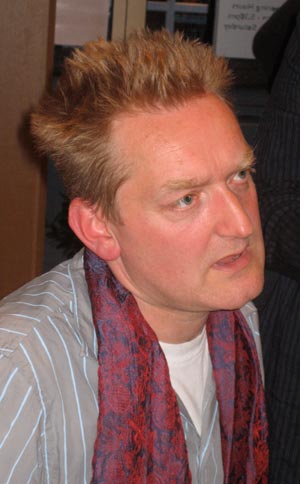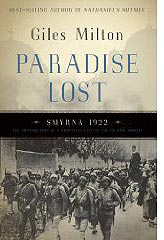  |
Book review by Theodoros Karakostas
Giles Milton's "Paradise Lost Smyrna 1922" is a welcome contribution to work pertaining to the Genocide of the Greeks and Armenians by the Turkish nationalists of Mustafa Kemal. It is a thoroughly researched book with a very impressive bibliography. Among the citations in the bibliography are George Horton's "The Blight of Asia", Edward Hale Bierstadt's "The Great Betrayal" and Marjorie Housepian Dobkin's "Smyrna 1922 the Destruction of a City". The Horton and Bierstadt books were written in the years immediately following the horrors that took place in Smyrna and have tragically been excluded from many historical examinations of the period owing to the politically advantageous position that Turkey has held with regard to the perceived commercial interests of the western powers.
 Milton has impressively established a concise history of Smyrna during its final years under the Ottoman Empire, and during the brief period of Greek rule. He vividly describes Smyrna and the large foreign populations which resided there, including a strong and prosperous America community. Attesting to the objectivity of the author with regard to the Turks, he writes of Rahmi Bey, Ottoman governor of Smyrna who during the period of the genocide of Greeks, Armenians, and Assyrians in Anatolia protected the Christian populations of Smyrna. Milton has impressively established a concise history of Smyrna during its final years under the Ottoman Empire, and during the brief period of Greek rule. He vividly describes Smyrna and the large foreign populations which resided there, including a strong and prosperous America community. Attesting to the objectivity of the author with regard to the Turks, he writes of Rahmi Bey, Ottoman governor of Smyrna who during the period of the genocide of Greeks, Armenians, and Assyrians in Anatolia protected the Christian populations of Smyrna.
This history depicted in this book is a must read, not only for Greeks and Armenians, but for all those worried about the vulnerability of democracy and the inability of the media to report accurate information. A case in point is the example of American High Commissioner Admiral Mark Bristol, who made no secret of his support for the Nationalists of Mustafa Kemal, and who openly expressed utter contempt for Greeks. Admiral Bristol appalled many American officials and members of the American community at the time owing to his anti-Greek racism. When he was compelled to assign three American journalists who would "objectively" cover the events transpiring in Smyrna, he made sure all three journalists would report favorably on the behavior of Kemal and the Turkish nationalists, while ensuring that the Greeks would be depicted as the perpetrators of atrocities.
Bristol was decisive in influencing the manner in which the events at Smyrna were covered, and in large part he is an important forerunner in America to the numerous pro-Turkish officials who ensure that American policy protects Turkey's falsified image and brutal policies at all cost. One year ago, the Bush administration blocked recognition of the Armenian Genocide in the House of Representatives. What shame can be attributed to today's pro-Turkish officials when Bristol did not just actively repress the commemoration of historical events, but who actively aided and abetted the Kemalists in their goal of exterminating Greek and Armenian Christians in Smyrna, and helping to cover up the evidence. Before Henry Kissinger and Cyprus, there was Admiral Mark Bristol and Smyrna.
Milton informs us that Admiral Bristol was so anti-Greek, that the New York Times published an editorial demanding his removal from his post and expressing dismay that American interests were being represented by such a person. Bristol horrified and appalled the members of the American community and other officials such as George Horton. The American community was sympathetic to the Greeks and the Armenians but they were drowned out by Admiral Bristol who had the last say in the formulation of policy, and in how the events of Smyrna were reported to the press.
In addition, Milton gives readers a great deal of insight into the views of Mustafa Kemal. As early as 1905, when he first visited Smyrna, Kemal desired the elimination of the Christian populations. When in the aftermath of the massacres at Smyrna, and the subsequent burning of the City, General Ismet Inonu expressed regret over the burning of Turkish territory (but not for the fate of the Greeks and Armenians). Mustafa Kemal expressed his joy over the events and assured Inonu that the City could easily be rebuilt. Milton's account of Mustafa Kemal make very clear his responsibility for the horrors that ensued, for it was Kemal himself who sent General Noureddin Pasha, a man known for his extremism, to Smyrna in the aftermath of the Greek evacuation.
Milton regretfully criticizes Greek ambitions in Asia Minor at one point, and falls for the traditional myth that the Greek campaign could not have succeeded. The fact remains that Greece, in so far as Venizelos remained in power, would have trounced the Kemalists. The hostility and jealousy by the Western powers to the Venizelist success in Asia Minor is however recounted by Milton. In the aftermath of the Greek liberation of Smyrna, amidst celebrations which included the participation of Metropolitan Chrysostom, an Italian soldier fired a shot in order to foment violence and disrupt the Greek diplomatic and political success that resulted in the liberation of Smyrna.
During the course of the War, the Italians, French, and British, alongside the Soviet Communists, each for their own interests armed and supported Mustafa Kemal's nationalists while cutting off all aid for the Greek Army. In light of these important facts, one can easily discern that the Greek campaign might have very well succeeded had it not been for the pro-Turkish interference of these divergent interests. In any case, "Paradise Lost" is a superb book that belongs on the shelves with other classic documents and historical works that pertain to the destruction and genocide of Hellenism and Christianity in Asia Minor.
 The publication of this book and its appearance in prominent bookstores such as Borders, Barnes and Noble and Eleftheroudakis (Greece) is very encouraging. This is another small but significant step forward in democratizing history in western libraries and bookstores who have far too long carried fawning works on the person of Mustafa Kemal and mythical books about a democratic Turkey. Giles Milton serves to remind everyone how the foundations of modern Turkey were built. The publication of this book and its appearance in prominent bookstores such as Borders, Barnes and Noble and Eleftheroudakis (Greece) is very encouraging. This is another small but significant step forward in democratizing history in western libraries and bookstores who have far too long carried fawning works on the person of Mustafa Kemal and mythical books about a democratic Turkey. Giles Milton serves to remind everyone how the foundations of modern Turkey were built.
Mr. Karakostas is a member of the Hellenic Electronic Center (HEC) www.Greece.org, a non for profit, no commercial organization. It was incorporated at the State of of Delaware in 1995 and has a network of 37,000 members. The main objective of HEC is to promote and protect the Hellenism and the Hellenic culture. |